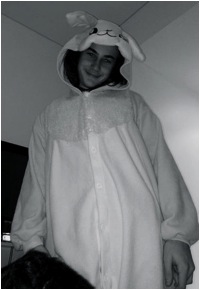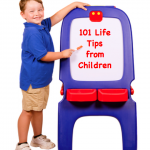An honest insight into 16 years of living with ADHD by Louisa Simmonds from Midlife Mayhem
I don’t believe in sugarcoating ADHD or looking at the disorder through rose-tinted glasses. Raising a child with ADHD is hard work and can be challenging and frustrating for parents.
But although children with ADHD may test the very boundaries of your patience as a parent, these kids are pretty cool in their own right too, with their own special foibles.
With the right support and management of their symptoms, there IS hope for the future of children with ADHD

Does My Child Have ADHD? Courtesy of Life Mental Health at www.flickr.comI’m going to tell you
I’m going to tell you the story of my ADHD son. For the purposes of this post, allow me to call him Kurt, (Kurt Cobain is his current alter-ego and therefore what I call him in my blog Midlife Mayhem) – that information in itself should give you a everything you need to know about his particular personality-type.
Kurt is now almost sixteen and was formally diagnosed with combined ADHD at the age of eleven. Which brings me to the first piece of advice I can give you about ADHD:
1. If your child has ADHD, you WILL suspect from an early age.
To be diagnosed with ADHD, a child must demonstrate symptoms (that meet certain criteria) before the age of seven. We saw them, although at the time we didn’t have a label for Kurt’s ‘differences’. As a baby, Kurt did not conform to any of the age-related developmental stepping-stones: he didn’t sleep at night, (even after lengthy and exhausting attempts at ‘controlled crying’), in fact he could sit happily in his cot or bed all night just banging his head against the wall; he was a late developer in his speech and was still ‘grunting’ his demands at the age of three (these are still ongoing issues at age 15) and he was hyperactive – at the time I assumed (and was told) that this was all indicative of normal ‘boy’ behaviour.
He also demonstrated ‘selective hearing’ and took everything we said literally – ‘pull your finger out’ was always highly entertaining. Once again, I blamed his selective hearing on being just another male trait.
But by the age of four when Kurt started school, the alarm bells really started ringing. His teacher was concerned by his lack of concentration, his inattentiveness, his need to get out of his seat all the time, his inability to share toys with other children and his poorly developed social skills. We’d obviously done a great job as parents, not even noticing that our child was a potential sociopath!
We had naively assumed that Kurt was a late-developer and couldn’t understand why our son struggled to fit in. We had also believed him to be bright, from the way in which he could hyper-focus on subjects that did interest him, like singing the same lyrics from songs, CONTINUOUSLY. Admittedly, his focus on the different ranges of guitar string was a little strange for a five year old, but what did we know?
2. Watch the signs, listen to the school – teachers are seeing kids with socialisation issues and different cognitive abilities all the time.
Upon the insistence advice of the school, we took Kurt for his first formal assessment for behavioural and learning difficulties at the age of six and came away with a diagnosis of….Dyslexia. The diagnosis explained his difficulties with letter and number work but it didn’t really address the problems like the fact that he was turning into the class clown at school, his refusal to eat anything with lumps or his desire to walk naked at all times in the house. We were sent away with some word games to play with him. Who were we to argue with an expert?
3. Listen to your heart and gut instinct – If you feel that something is not right, seek a second opinion.
Over the next five years Kurt was to change schools three times. He lacked focus in class, was talkative, did not socialise well and was labeled the troublemaker by the school. It was the social issues that hurt me the most as a parent. I wanted my boy to have friends; every time he told me that he had not been invited to the latest class party, I wept a little inside.
In Year 6 Kurt’s teacher called me into school to tell me that Kurt had ADHD. It wasn’t the first time the word ‘ADHD’ had been bandied about. She was very straight with me. She wanted me to seek a diagnosis immediately so that Kurt could be put on medication before he went to high school – she was fearful for his outcome there, without support.
After six months of waiting lists and assessments by counsellors and paediatricians, Kurt took his first Concerta tablet. I wasn’t comfortable about medicating my child but I had done my research and in spite of the controversy surrounding stimulant medication, when the specialist gave me the analogy of not administering medication to an ADHD child with removing the glasses from a shortsighted child, it made sense.
4. Do your research in regard to the choice between medication and behavioural therapy. I wholeheartedly believe that in Kurt’s situation we were too far down the line for our son to respond quickly enough to behavioural therapy. We were running out of time.
The symptoms of his ADHD had begun to affect his life choices.
Because Kurt hadn’t been offered a place at any of the private schools that we had selected (based on small class numbers and pastoral care) due to his school reports, we were forced to enrol him in the large local high school. That choice ultimately turned out to be disastrous.
During the first year on his medication, we did see a huge improvement in Kurt’s language comprehension, concentration and behaviour and he began to make the first friends he had ever had. By the second year of high school, his behaviour in class had begun to deteriorate again and we upped his medication on the advice of the paediatrician, on the basis of a growth spurt. By the third year of high school, the school was regularly contacting me – Kurt wasn’t completing assignments, his behaviour in class was very challenging and Kurt also hinted to us that he was being bullied by some of his peers.
The deputy head of the school and I began to meet on a regular basis, so much so that Kurt once questioned in a meeting if we were having an affair – the poor man was mortified. I also found out that in certain classes, Kurt was being sent out of the room for poor behaviour and forgotten about.
5. Communicate with the school. It is difficult to track your child’s progress in high school when they have a myriad of different teachers. You have to become that ‘nuisance’ parent, the type of parent the staff sighs at when you phone or walk through the gates of the school. You need to be heard for the sake of your child. Once you have made sure that all your child’s teachers know about their ADHD, request all of their email addresses and keep the pressure on the school to maintain their expectations regarding your child’s progress. Even now, I insist that all assignments are sent to me as well as handed to Kurt.
Make sure the school knows YOU so that they make your child a priority.
You will be surprised that teachers are generally appreciative of any advice you can give them regarding your child’s needs. There is still a lot of bad press about ADHD and no real funding to educate teachers about the disorder, so any information you can give them can make a huge impact on your child’s school experience and learning.
Towards the end of Year 9 I discovered that Kurt was ‘wagging’ more than attending school. ‘Lying’ is a big problem with ADHD kids and Kurt can still pull the wool over my eyes. Kurt was not keeping up academically, and was becoming overwhelmed by the workload. The final straw was when I went to a parents evening only to discover that the majority of his teachers did not even know about his ADHD, (or the deaf girl in the same class). The other issue was the bullying – Kurt had been spending break times at school hiding in the library or toilets, picking at the scabs on his arms out of anxiety, until they bled.
6. Bullying is not tolerated in public schools but it is hard to ‘police’ and kids with special needs seem to attract it. Back I marched to the school, the archetypal ‘helicopter’ parent that I had become, and we discussed new ideas for how best to support Kurt’s needs.
Then one day I found my fifteen year old boy sobbing in his bedroom and when I asked him what was wrong, he looked up at me and said, ‘I’m not going back to that school, Mum. I’m never going back.’ Another school change loomed ominously.
7. ADHD kids may change schools several times, but it’s not the end of the world. These kids are ‘round pegs’ in square holes in school and for many of them their time in formal schooling, (which cannot customize its curriculum to the needs of every student), will be a difficult one. Kurt changed school again this year; to a performing arts school this time. It is a school that is more liberal and supportive of his passion for music and singing, but even this move has not been without its issues. He has friends now, thankfully; kids like him, fellow creative (ADHD?) kids, who are all teenagers at a challenging time in their young lives, equally driven by hormones, angst and the need to self-medicate and live life on the edge.
Life with ADHD is not always a bed of roses, but it’s never boring.
 The law of attraction means that ADHD kids tend to attract other ADHD kids. Kurt has had an interesting forage into the adult world of sex, drugs and rock n’ roll this past few months, as well as his first experience of depression; an experience I do not want him to repeat. His finest moment was when he paraded through Darling Harbour recently, drunk, in a rabbit onesie.
The law of attraction means that ADHD kids tend to attract other ADHD kids. Kurt has had an interesting forage into the adult world of sex, drugs and rock n’ roll this past few months, as well as his first experience of depression; an experience I do not want him to repeat. His finest moment was when he paraded through Darling Harbour recently, drunk, in a rabbit onesie.
Extreme behaviour goes with the territory.
8. Don’t assume that things will suddenly get better with ADHD, but they can with the right support. I don’t believe that Kurt will outgrow his ADHD like some kids do. It seems to be ingrained in his personality-type. I just hope that with our help he can learn to manage it.
But here is the really good news:
Our house is never boring.
People with ADHD do think differently to us but are often very talented in particular areas such as performing and entrepreneurism. Our son is an intuitive, gifted musician and has given us immeasurable joy in his performances. You only have to look as far as Will.i.am, Robbie Williams, Adam Levine and Richard Branson for successful people who have been able to manage their ADHD and use it to their advantage.
Harnessed in the right way, that obsessional hyper focus often breeds success.
Kurt is fun to be around. Yes, he is too noisy a lot of the time, sometimes a bit aggressive and opinionated and the nudity takes some getting used to, but most of the time our son is high on life and it can be highly infectious. And he is far from stupid. We all know that intelligence can’t be measured by ATAR scores and the sooner we, the parents of ADHD kids, accept that premise, the more time we will have to support our child’s interests.
‘Difference’ and freedom of expression are slowly being exploited in a more positive light in our society, where once they were hidden. Look at the impact of recent fictional characters such as Don Tillman in Graeme Simsion’s The Rosie Project and Pat Solitano in Silver Linings Playbook – these quirky characters have been embraced. Now we just need our governments to follow suit with some appropriate funding for additional support for our children in mainstream education.
The biggest frustration I have with the topic of ADHD with other parents is the attitude that the disorder doesn’t exist, that are kids are just naughty, ‘feral’ kids. I could tell those parents stories about Kurt that would make their toes curl, events which have forced me to accept that my son is wired differently and I have had to learn to respect and embrace that ‘difference’.
I don’t need a label for Kurt; I just need to know how I can support him, how to keep my expectations high for his future and how best to love him for who he is.
“Without deviation from the norm, progress is not possible.” — Frank Zappa
Louisa Simmonds and Vivian Dunstan have recently set up the Northern Beaches ADHD Support Group (www.northernbeachesadhdsupportgroup.com.au) to support parents of children and teenagers with ADHD. The group meets every six weeks in Mona Vale on the Northern Beaches of Sydney.
Louisa thank you so very much for sharing your gorgeous son Kurt with us, let’s all keep thinking outside the box, I believe there is fun to be had Love Nathalie
You might also like
Louisa Simmonds
Latest posts by Louisa Simmonds (see all)
- What I Have Learned About ADHD - 08/05/2013







What an amazing well written blog and so much to learn from it. I work with children with ADHD and it is a challenge but it is also fun and we laugh a lot. It is also rewarding. I think this article will help many people so am going to share on twitter.
Yes Louisa wrote about Kurt and how she has gone through the last 16 years so eloquently and honestly. I too work with Children with ADHD we laugh a lot too. Hope you are well lovely x
Thank you, i have a Mr 6 he was officially diagnosed with adhd at 5 and also has motor dyspraxia what a great combo, i have like many others resisted the adhd label due to negative media but have always know something was a miss from birth he hardly slept and when he did had to be rocked or held, so far i have resisted stimulate medication and have been treating him with a no/low additive diet, a good omega 3 and magnesium tablet, we have a firm routine in place and use things like Epson salt baths, weighted blanket and hand held massager as part of his bedtime routine he loves sport and is obsessed with football, his a smart boy who loves to learn but finds it hard to sit still and maintain friendships he has already been labeled as the naughty kid at school and has only been invited to 1 party in the last 18 months, the school knows him by name the teachers know me by name and i can always hear him before i see him, but that’s ok he is the kid with a kind heart who picks his teacher a flower every day before school who asks to many questions and will shed physical tears of concern when the neighbors dogs escape and i dont jump immediately to rescue them to safety, he has a great memory, awesome humor & debating skills beyond his years. He is my son and while i have no doubt there will be many rough times ahead, im just as sure we will have plenty of laughs too.
Wow, amazing you and your son. He has an amazing giving heart a value that will keep him going. X
Linda –
It may be worth having your son tested for Giftedness. There is some interesting research on the misdiagnosis of ADHD
as many of the “symptoms” of both Giftedness and ADHD are very similar, particularly in children aged under 7.
What an incredible story, thank you for putting yourself out there. I think this will be a huge help to other parents of children with ADHD, and others.
It’s such an honest account. Thanks for reading
Thank you for sharing your story, so helpful to hear how you championed his cause through school and it seems, rolled with the flow of things. And great to hear the positives of living with someone with ADHD Thank you.
Helpful I believe because after 16 years Louise has pretty much covered everything
The story of your son’s early schooling and diagnosis in late primary school sounds so very similar to that of a dear friend’s son who has only been diagnosed in the last 12 months. Thank you for sharing your experiences and insight, these are such important stories to be shared.
Thanks Christie, hoping your friend will now receive all the support her son needs.
Thankyou so much for this article…one of my twins borders on ADHD and I recognise many of these same scenarios,,,so informative and really so helpful. Thank you so much for sharing your personal journey with us…I have learnt a lot!
What an important story to share. I only know ADHD as an outsider… as a friend, as a teacher… more people need to know what it is like as an insider.
It is so very important to understand what it’s like on the inside.
It’s so important to connect with other’s stories like this to help build your understanding of children with ADHD and the struggles that parents (and the child) go through as a result. An interesting read and I loved how it finished on a positive note highlighting Kurt’s wonderful personality and traits!
Louisa, thank you so much for sharing so honestly about your son. As a young family, we are only starting our journey with (possible) ADHD. Your words of wisdom and experiences are most helpful. xo P
Thank you for sharing your story, it was fascinating reading and I feel like I have learned so much about ADHD.
Thanks so much for sharing this incredible story and for showing so clearly how others going through similar things can break it down to make it all more manageable and fun. A great post.
My ADHD 12yr old son just asked me for a onesie…I now know what my answer will be! Beautifully written Louisa and thanks for sharing Nat xo
I found this post to be very interesting and potentially helpful to many parents who are struggling with a child who has ADHD. A proper assessment is so important in order to get the correct diagnosis! It is also possible for a child to have more than one diagnosis, such as a learning disability and ADHD, which sounds like this is Kurt’s experience.
Bravo to you for supporting and being such a good advocate for your son!